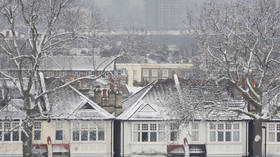Freezing to death: Unheated homes killed over 16,000 people across UK last winter, govt watchdog finds

Staggering energy prices are taking a toll on those unable to pay their bills, a UK regulator has admitted, confirming that thousands of people may have died because of fuel poverty and lack of heating during winter.
The most vulnerable households spend more on their energy bills than wealthier ones, and “can therefore be at greater risk of fuel poverty,” according to a comprehensive new study by the Office of Gas and Energy Markets (Ofgem) on Thursday.
Fuel poverty, a common UK term for customers who cannot afford to keep adequately warm at an affordable cost, “increases the risk that people [will] develop ill health,” it acknowledged.
Over winter 2017-18, we estimate that fuel poverty may have contributed to 5,500 excess winter deaths and that 16,500 excess winter deaths may have been linked to people living in cold homes.
The shocking death toll occurred despite the government trying to make energy more “cost reflective” for disabled people, seniors and those living on income support. £2.5 billion ($3.8 billion) was spent on that effort, and maximum prices for standard tariffs were cut.
The revelation comes as the UK braces itself for the consequences of its departure from the EU, which – as the government’s own findings suggest – will herald bad news for “low-income groups” in case of a “no-deal” scenario.
A hard Brexit will hit them most because a bigger proportion of their money is spent on food and fuel, according to the Operation Yellowhammer files disclosed at the demand of opposition MPs.
Also on rt.com Released ‘Operation Yellowhammer’ docs suggest delays & rising prices in ‘worst case’ no-deal BrexitSupermarkets are expected to increase prices as supplies of food, including fruit and vegetables imported from continental Europe, will be delayed at customs borders.
And while no disruption to electricity or gas supplies is expected, there will “probably be marked price rises for electricity customers with associated wider economic and political effects,” the dossier warned.
Subscribe to RT newsletter to get stories the mainstream media won’t tell you.














